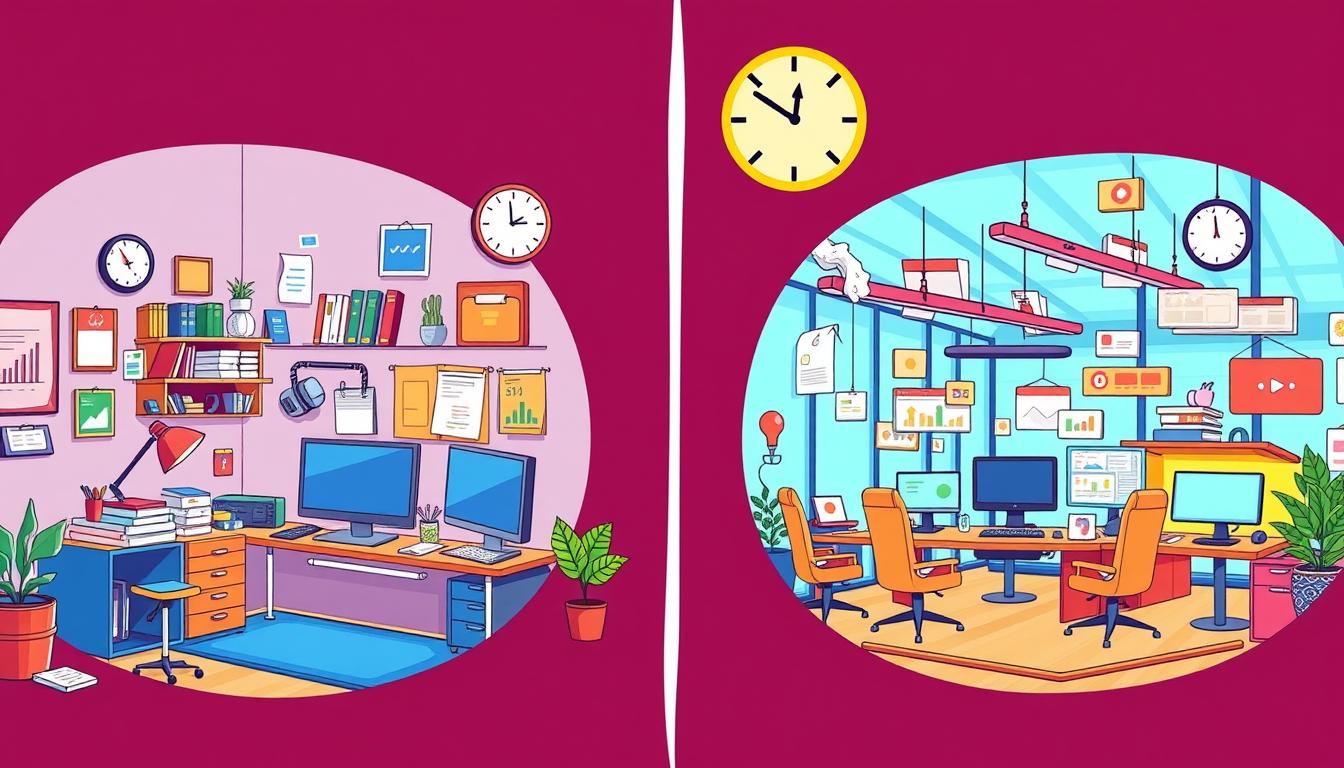Case Study: Turning a Side Hustle into a Full-Time Business
Ever dreamed of making your passion project a big success? The world of business is full of stories where side hustles turned into major companies. A study by NatWest found that 45% of people in the U.K. want to earn more through side hustles. This trend is happening all over the world, changing how we see work and growing our careers.
Shannon’s story is a great example. She turned her online courses into a big business, making $36,500 in 2018 with just 1,999 subscribers. Her journey shows how a side hustle can become a full-time job, proving the power of digital entrepreneurship.
Chuck Temple also made a big impact. He started three companies worth over a million dollars, including DVD Your Memories. This company grew from almost nothing to a top name in the U.S. These stories show the exciting chances in small business and entrepreneurship.
In this case study, we’ll look at the strategies, challenges, and wins of those who went from side hustle to full-time business. Whether you’re starting out or just interested, this journey into modern business creation will be both enlightening and motivating.
Key Takeaways
- 45% of people in the U.K. aim to increase income through side hustles
- Successful side hustles can generate significant revenue with small audiences
- Transitioning to full-time business requires strategic planning and execution
- Choosing the right tools and platforms is crucial for business growth
- Balancing a full-time job with a side hustle requires effective time management
- Real-life success stories demonstrate the potential of side hustles
- Continuous learning and adaptation are key to long-term success
Introduction: The Rise of Side Hustles
Side hustles have become very popular, with millions wanting more control over their work and life. This change shows how people now view their careers and financial stability. In 2024, 36% of U.S. adults had a side hustle, showing how common these ventures are.
What is a Side Hustle?
A side hustle is a second job or business done alongside a main job. It often starts as a hobby or to make extra money. Many side hustles grow from a need or a desire to be creative, not just as a full-time job.
Why People Start Side Hustles
People start side hustles for different reasons. Some want financial security. Others want to try freelancing or start a business. Gen Z and millennials are leading this trend, with 48% of Gen Z having side hustles.
Common Motivations for Transitioning
Many want to turn their side hustle into a full-time business. Key reasons include:
- Financial independence
- Pursuit of passion projects
- Desire for flexible work arrangements
- Opportunity to build startups
The appeal of side hustles is clear when looking at average hourly rates for popular gigs:
| Side Hustle | Average Hourly Rate |
|---|---|
| Website Development | $45.00 |
| Social Media Management | $31.00 |
| Tutoring | $35.00 |
| Virtual Assistant | $24.00 |
With 62% of Gen Z open to starting their own business, the future of entrepreneurship looks bright. Side hustles are a low-risk way to get into freelancing and startups. They let people chase their dreams while keeping their finances stable.
Identifying a Profitable Niche
Finding a profitable niche is key for self-employment and business growth. It’s the base for a successful career change. The right niche matches your passions with what people want, leading to lasting success.
Market Research Techniques
Good market research is vital for finding profitable niches. Look at what people buy, do surveys, and read industry reports. For example, Bailey’s Discount Center knew their market well. They offer big discounts, drawing in customers who travel far to shop.
Assessing Personal Interests and Skills
Your skills and interests can guide you to a profitable niche. Think about what you love and how it meets market needs. Many entrepreneurs turn hobbies into successful businesses. Focusing fully on your interests can lead to lasting success.
Evaluating Competition
It’s important to study your competitors to find your niche. Look for areas where you can offer something new. While 1 in 100 marketers succeed in tough niches, a good niche is less crowded. Look at examples of niche sites that make money with little effort.
| Factor | Percentage |
|---|---|
| Lack of niche knowledge | 45% |
| Insufficient budget | 35% |
| Audience saturation | 25% |
| Content generation issues | 30% |
By doing deep market research, using your skills, and understanding competition, you can find a profitable niche. This sets the stage for long-term business growth and a successful career change.
Crafting a Business Plan
Turning a side hustle into a full-time business needs careful planning. A good business plan is like a roadmap to success. Let’s look at the main parts of a solid plan for your small business or startup.
Defining Your Business Goals
Setting clear goals is key for your entrepreneurial journey. Research shows 70% of successful entrepreneurs did thorough market research before starting. Think about these goals:
- Become a full-time business owner within 1 year
- Achieve debt-free status before starting
- Maintain recurring revenue of at least 50% of your minimum monthly income
Creating a Financial Plan
A strong financial plan is crucial for small business success. Here are important points to consider:
- Set a savings benchmark of 6 months’ living expenses
- Calculate your minimum monthly take-home amount
- Track side gig income monthly to understand variability
Outlining Marketing Strategies
Good marketing is key for growth. Focus on these areas:
- Identify your target market
- Develop a unique selling proposition
- Utilize digital marketing channels
| Business Type | Annual Revenue Potential | Growth Rate |
|---|---|---|
| E-commerce | $1M – $2.5M | 18% (2013-2015) |
| Manufacturing | $1M – $2.5M | 21% (2012-2015) |
| Professional Services | $1M – $2.5M | 33% (2011-2015) |
Remember, a well-structured business plan boosts your success chances. It guides your decisions, helps secure funding, and keeps you on track with your entrepreneurial goals.
Building a Brand Identity
Creating a strong brand identity is key for small businesses and startups. It helps turn passion projects into full-time ventures. A well-crafted brand can make your business stand out and help it grow.
Choosing a Memorable Business Name
Your business name is the base of your brand. It should be unique, easy to remember, and show what you offer. Use specific top-level domains like .repair or .plumbing to make it easier to find.
Designing a Logo and Visual Identity
A consistent visual identity makes your brand easy to recognize. This includes your logo, colors, and design style. Spend time on your logo to make sure it shows your business values and appeals to your audience.

Establishing an Online Presence
A professional website is key for turning a side hustle into a full-time business. It shows you’re serious and lets customers interact directly. Add clear testimonials and success stories to build trust. Use SEO and search engine marketing to get more visibility.
“A well-designed website can elevate a side hustle from ‘hobby’ to ‘business,’ establishing a level of professionalism that word of mouth and social media alone cannot achieve.”
A strong brand identity can really help your business grow and make more money. Define your target audience, create a brand story, and set aside money for branding and marketing.
| Branding Element | Impact on Business |
|---|---|
| Professional Website | Increases credibility and customer acquisition |
| SEO Optimization | Improves online visibility and traffic |
| Customer Testimonials | Enhances trust and conversion rates |
| Cohesive Visual Identity | Improves brand recognition and recall |
Marketing Your Side Hustle
Marketing is vital for making your side hustle a full-time success. With 45% of Americans having side hustles, it’s important to stand out. Good marketing helps you find your audience and grow your business.
Utilizing Social Media Effectively
Social media is a strong tool for freelancers and self-employed people. Share high-quality photos and videos of your work. It’s important to keep your brand message the same on all platforms.
Interact with your followers often. This helps build a loyal community and attracts new customers.
Content Marketing Strategies
Create content that speaks to your audience. Use blog posts, videos, and infographics to show your expertise. Building an email list is key for nurturing leads and growing your business.
Keep your content consistent and high-quality. This keeps your audience interested and engaged.
Leveraging Influencer Partnerships
Working with influencers can increase your visibility and credibility. Choose influencers who share your brand’s values. These partnerships can open up new markets and speed up your side hustle’s growth.
Remember, being genuine is crucial in influencer marketing.
By using these marketing strategies, you can boost your visibility, attract customers, and turn your side hustle into a full-time business. Stay dedicated to your marketing efforts, and you’ll see your business grow.
Balancing a Full-Time Job and Side Hustle
Turning a side hustle into a full-time business is a big challenge. It means juggling work and your growing business. This balance is key for a smooth career change.
Time Management Techniques
Managing your time well is crucial when you have a side hustle and a full-time job. Set aside specific hours for your side business. This helps you stay focused and productive.
For example, use evenings or weekends for your side project. This way, you can work on it without getting in the way of your main job.
It’s important to prioritize tasks. Focus on the activities that will help your side hustle grow the most. Use apps or to-do lists to keep track of what needs to be done.
Remember, it’s about being smart with your time, not just working a lot.
Setting Boundaries for Work-Life Balance
Setting clear boundaries is key when you have a lot on your plate. Talk openly with your employer, family, and friends about your side hustle. This helps manage their expectations and gets their support.
Also, have separate workspaces for your main job and side hustle. This helps you mentally switch between tasks. It keeps you focused on what you’re doing.
| Strategy | Full-Time Job | Side Hustle |
|---|---|---|
| Work Hours | 9 AM – 5 PM | 7 PM – 10 PM |
| Workspace | Office Desk | Home Office |
| Communication | Work Email | Personal Email |
The goal is to find a routine that supports your side hustle without hurting your job or personal life. With the right approach, you can make your side hustle a full-time business.
Measuring Growth and Success
In the world of entrepreneurship, tracking progress is key to business growth. Startups and side hustles need clear metrics to gauge their success. Let’s explore how to measure your venture’s performance effectively.
Key Performance Indicators (KPIs)
KPIs are vital for understanding your business’s health. For side hustles, these might include:
- Monthly revenue
- Customer acquisition cost
- Client retention rate
- Profit margins
A study shows the average side hustle generates $8,000 annually. Track your income against this benchmark to assess your progress.
Feedback and Adaptation Strategies
Customer feedback is gold for startups. Use surveys, reviews, and direct conversations to gather insights. Then, adapt your strategies based on this feedback.
| Metric | Goal | Actual |
|---|---|---|
| Monthly Revenue | $2,000 | $1,800 |
| Client Satisfaction | 90% | 85% |
| New Clients/Month | 5 | 4 |
Remember, success in entrepreneurship isn’t just about numbers. It’s about growth, learning, and adapting. Keep refining your approach, and your side hustle might just become your main gig.
Preparing for Transition to Full-Time
Turning a side hustle into a full-time business is exciting. It requires careful planning and financial checks. Let’s look at the key steps for a smooth transition to self-employment.
Assessing Financial Stability
Before you jump, check if you’re financially ready. Your side gig should make 75% of your current salary for 6 months. It’s smart to save 6-12 months of living expenses. This gives you peace of mind during the change.
| Financial Milestone | Recommended Target |
|---|---|
| Side Hustle Income | 75% of current salary for 6+ months |
| Emergency Fund | 6-12 months of living expenses |
| Monthly Revenue | 100% coverage of monthly expenses |
Creating an Exit Strategy from Your Job
Plan your exit well. Start building a client base while still working. It usually takes 15 months to go full-time. Aim to make 80% of your salary by the 13th month before quitting.
Kerry and Liam Bilson’s story is a great example. They quit when their side hustle matched their combined salaries in December. This was their sign to go full-time.
“We knew it was time when our side business outpaced our regular jobs. It felt scary but exciting to take that leap,” shared Kerry Bilson.
A successful transition needs patience and planning. Keep track of your progress and build a strong base. You’ll be ready to make your side hustle a full-time success.
Real-Life Success Stories
Many entrepreneurs have turned side hustles into thriving businesses. Let’s look at two amazing stories in small business and freelancing.
From Etsy to Full-Time Artisan
Sarah’s journey from hobbyist to full-time artisan is inspiring. She started her Etsy shop in October 2014, while working a marketing job. Her dream was to work less than 40 hours a week on personal projects.
Sarah’s first online sale was a $9.99 ebook in April 2015. She worked hard to build an audience before launching her Personal Productivity Toolkit in October 2015. This earned her her first few thousand dollars online.
By Q4 2016, Sarah matched her full-time salary through consulting and product income. On December 16, 2016, she became a full-time self-employed person. In January 2017, she was working 15-20 hours a week in Bali, earning more than her previous job.
Freelance Graphic Designer’s Journey
Andrew’s freelance journey started at age 12 in 1994. He rekindled his side hustle 5-6 years ago, focusing on LEGO animation. Within six months, he landed his first video commission.
Andrew’s success includes:
- Generating $400 from eBay sales during a single comedy show
- Producing 7 stop-motion videos for a large insurance company
- Working with brands like Disney and Star Wars
Andrew stresses the importance of balancing work and personal time for creativity. He alternates between study and production, showing effective time management in freelancing.
| Entrepreneur | Start Year | First Sale | Full-Time Transition |
|---|---|---|---|
| Sarah | 2014 | $9.99 ebook (2015) | December 2016 |
| Andrew | 1994 (reignited ~2017) | LEGO animation commission | Gradual growth |
Conclusion: Staying Committed to Your Vision
Turning a side hustle into a full-time business is an exciting journey. It requires grit, passion, and a clear vision for growth. The path may be tough, but the rewards can be incredible.
Embracing Challenges and Learning
Entrepreneurs face many obstacles. A 2020 report shows that 86% of leaders believe defining a purpose is key to success. Set SMART goals – Specific, Measurable, Achievable, Realistic, and Time-bound.
This approach helps avoid feeling overwhelmed and keeps you motivated. It’s a great way to stay on track with your entrepreneurial journey.
The Importance of Networking and Community
Building a strong network is crucial for your passion projects. Take inspiration from Kerry and Liam Bilson, who won Young Entrepreneurs of the Year at the Great British Entrepreneur Awards. Their success shows the power of community support in achieving business milestones.
Remember, commitment to your vision is key. Like Judi Sheppard Missett of Jazzercise or Ben Cohen and Jerry Greenfield of Ben & Jerry’s, your side hustle could become a global success. Stay focused, learn from challenges, and lean on your network. Your entrepreneurial dream is within reach!
Source Links
- https://accessally.com/case-study/shannon-mattern/ – How Shannon Mattern Went From Side Hustle to Full-Time Business Using AccessAlly – AccessAlly
- https://www.rd.com/article/how-to-turn-a-side-hustle-into-a-full-time-job/ – I Quit My Job and Turned My Side Hustle into a Six-Figure Business—Here’s How
- https://voices.berkeley.edu/podcast/side-hustle-startup – From Side Hustle to Startup
- https://www.entrepreneur.com/starting-a-business/how-to-turn-your-side-hustle-into-a-full-time-business/457876 – How to Turn Your Side Hustle Into a Full-Time Business | Entrepreneur
- https://www.linkedin.com/pulse/entrepreneurship-case-study-rise-side-hustles-among-gen-ub9jc – Entrepreneurship Case Study: The Rise of Side Hustles Among Gen Zers
- https://www.coursera.org/articles/side-hustle – 27 Side Hustle Ideas and How to Get Started
- https://www.nfib.com/news-article/from-humble-beginnings-the-bailey-brothers-turn-a-side-hustle-into-successful-small-business/ – From Humble Beginnings: the Bailey brothers turn a side hustle into successful small business – NFIB
- https://www.warriorforum.com/main-internet-marketing-discussion-forum/1024987-beginners-niche-you-will-always-make-money.html – For Beginners: The niche you will always make money with.
- https://dommyrossdigital.com/case-study-turning-a-side-hustle-into-a-full-time-business/ – Case Study: Turning a Side Hustle into a Full-Time Business – DommyRoss Digital
- https://theadminbar.com/how-to-plan-the-leap-from-side-hustle-to-full-time-agency-owner/ – How to plan the leap from side-hustle to full-time agency owner – The Admin Bar
- https://tim.blog/2017/12/30/how-to-build-a-million-dollar-one-person-business/ – How to Build a Million-Dollar, One-Person Business – Case Studies From The 4-Hour Workweek – The Blog of Author Tim Ferriss
- https://startupnation.com/start-your-business/12-keys-to-choosing-and-developing-a-side-hustle-idea/ – 12 Keys to Choosing and Building Your Best Side Hustle
- https://www.name.com/blog/building-a-website-for-your-side-hustle – Building a Website for Your Side Hustle – Name.com Blog
- https://www.zilliondesigns.com/blog/small-business-professional-brand-identity/ – How To Build Professional Brand Identity For Small Business
- https://www.novo.co/blog/15-things-to-do-before-turning-your-side-hustle-into-a-full-time-business – How to Turn Your Side-Hustle Into a Full-Time Business | Novo
- https://www.forbes.com/councils/forbesbusinesscouncil/2024/07/09/how-to-turn-your-side-hustle-into-a-full-time-business/ – Council Post: How To Turn Your Side Hustle Into A Full-Time Business
- https://www.scribemind.com/blog/balancing-a-full-time-job-with-a-creative-side-hustle – Balancing a Full-Time Job with a Creative Side Hustle — Scribemind.
- https://steeringpoint.ie/worklife/juggling-a-full-time-job-and-a-side-hustle/ – Juggling a Full-time Job and a Side Hustle
- https://hbr.org/2020/03/make-your-side-hustle-work – Make Your Side Hustle Work
- https://www.klipfolio.com/blog/side-hustle-metrics – Side hustle metrics: What you need to consider for side hustle success | Klipfolio
- https://vision.leahgervais.com/sysh – Scale Your Side Hustle
- https://get.yourapprovd.com/turning-your-side-hustle-into-a-full-time-business-a-comprehensive-guide/ – Turning Your Side Hustle into a Full-Time Business: A Comprehensive Guide – Get Fast, Competitive Business funds and Financing with Approvd
- https://mynewmeta.com/p/the-side-hustle-to-full-time-business-blueprint – The Side Hustle to Full-Time Business Blueprint
- https://medium.com/@paulminors/side-hustle-success-story-and-lessons-learned-from-full-time-job-to-traveling-indie-entrepreneur-bccca9051fe3 – Side-hustle success story (and lessons learned): from full-time job to traveling indie-entrepreneur…
- https://www.plannthat.com/influencer-side-hustle/ – The Story Of A Successful Side-Hustle Told By The Influencer Of The Year
- https://asana.com/resources/long-term-goals – How to Accomplish Big Things with Long-Term Goals [2024] • Asana
- https://www.investopedia.com/terms/e/entrepreneur.asp – Entrepreneur: What It Means to Be One and How to Get Started
- https://www.aihr.com/blog/organizational-commitment/ – 7 Ways To Boost Organizational Commitment







